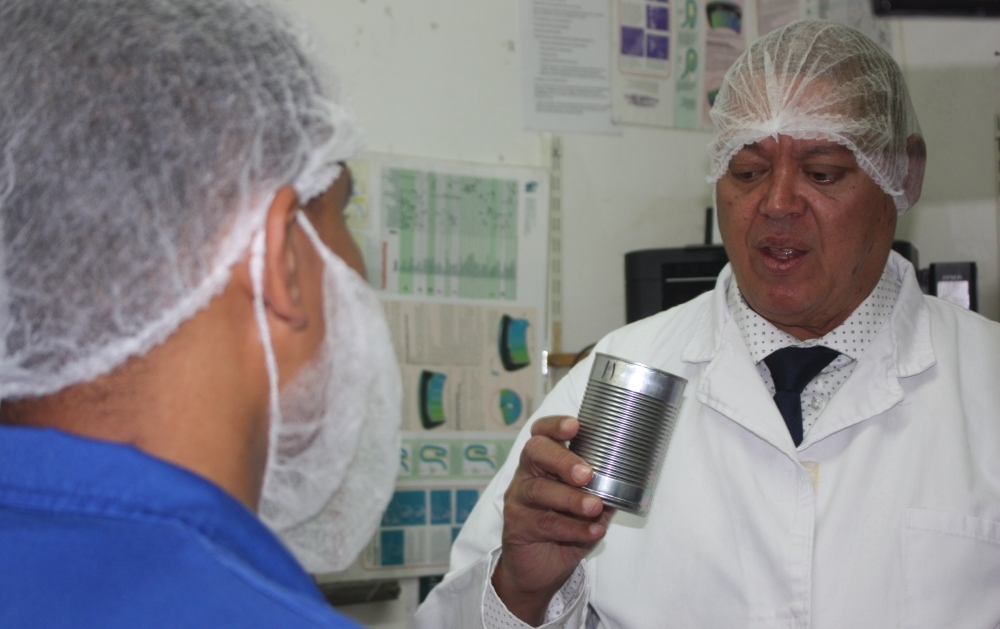Etosha Fishing cannery in full swing
Relief quota
The Minister of Fisheries and Marine Resources Derek Klazen paid a visit to the Etosha Fishing Cannery in Walvis Bay recently.
Canning operations commenced at the the Etosha Fishing Cannery in Walvis Bay after a prolonged period of down time.
The Minister of Fisheries and Marine Resources Derek Klazen paid a visit to the facility where he observed operations and the processing of the relief quota first hand. The company received an allocation of 5 000 metric tons (MT) of horse mackerel as approved by Cabinet through the ministry as a governmental objective to sustain the cannery and preserve jobs.
Klazen emphasised that Etosha’s cannery operations couldn’t have started at a better time. Adding that the company is canning Namibia’s own horse mackerel. “In the past we used to can pilchards because we had an abundance of pilchards in this country. Due to over-exploitation, the government has since allocated a zero Total Allowable Catch (TAC) on pilchards. There are some signs that pilchards are returning, but the biomass is not enough to allow a TAC.”
The minister stated that horse mackerel stocks are also starting to show signs of decline. “My scientists have informed me that the TAC of horse mackerel may also drop from year to year, so we need to look into ways to protect our horse mackerel stocks.”
Etosha Fishing’s managing director Volker Paulsmeier said that the company will initiate a turnaround strategy aimed at securing the long-term sustainability of Namibia’s sole operational cannery. “We are extremely grateful to the government and the fisheries ministry for this lifeline which prevents the cannery from shutting its doors for good. The relief quota buys us a little time to refine and put in place our turnaround strategy to ensure extended employment terms for our workers as part of our long-term sustainability strategy.”
Etosha’s shop steward Rosalia Amakali extended a word of gratitude toward the minister for the allocation of the relief quota. “We have been in a very difficult position because we almost lost our jobs due to the fact that there was no fish quota allocated to us. We hope that more quotas can be allocated to us so that there is more employment. When we started off we were about 800 and now we are only 480. We hope that the government can see how hardworking we are so that they can provide more relief to the people of Namibia.”
The Minister of Fisheries and Marine Resources Derek Klazen paid a visit to the facility where he observed operations and the processing of the relief quota first hand. The company received an allocation of 5 000 metric tons (MT) of horse mackerel as approved by Cabinet through the ministry as a governmental objective to sustain the cannery and preserve jobs.
Klazen emphasised that Etosha’s cannery operations couldn’t have started at a better time. Adding that the company is canning Namibia’s own horse mackerel. “In the past we used to can pilchards because we had an abundance of pilchards in this country. Due to over-exploitation, the government has since allocated a zero Total Allowable Catch (TAC) on pilchards. There are some signs that pilchards are returning, but the biomass is not enough to allow a TAC.”
The minister stated that horse mackerel stocks are also starting to show signs of decline. “My scientists have informed me that the TAC of horse mackerel may also drop from year to year, so we need to look into ways to protect our horse mackerel stocks.”
Etosha Fishing’s managing director Volker Paulsmeier said that the company will initiate a turnaround strategy aimed at securing the long-term sustainability of Namibia’s sole operational cannery. “We are extremely grateful to the government and the fisheries ministry for this lifeline which prevents the cannery from shutting its doors for good. The relief quota buys us a little time to refine and put in place our turnaround strategy to ensure extended employment terms for our workers as part of our long-term sustainability strategy.”
Etosha’s shop steward Rosalia Amakali extended a word of gratitude toward the minister for the allocation of the relief quota. “We have been in a very difficult position because we almost lost our jobs due to the fact that there was no fish quota allocated to us. We hope that more quotas can be allocated to us so that there is more employment. When we started off we were about 800 and now we are only 480. We hope that the government can see how hardworking we are so that they can provide more relief to the people of Namibia.”




Kommentaar
Republikein
Geen kommentaar is op hierdie artikel gelaat nie